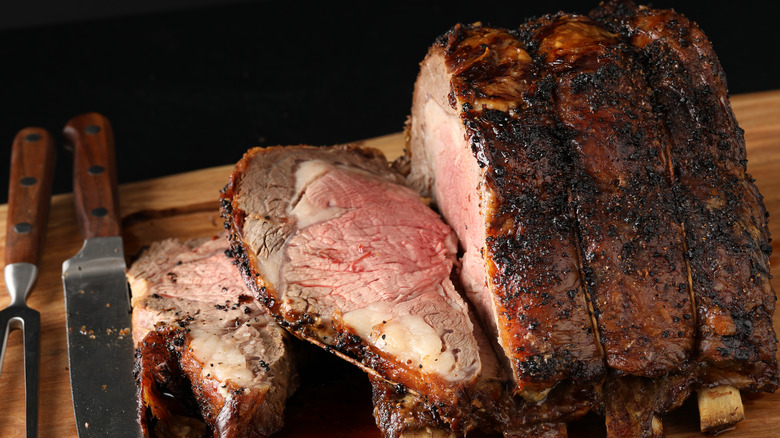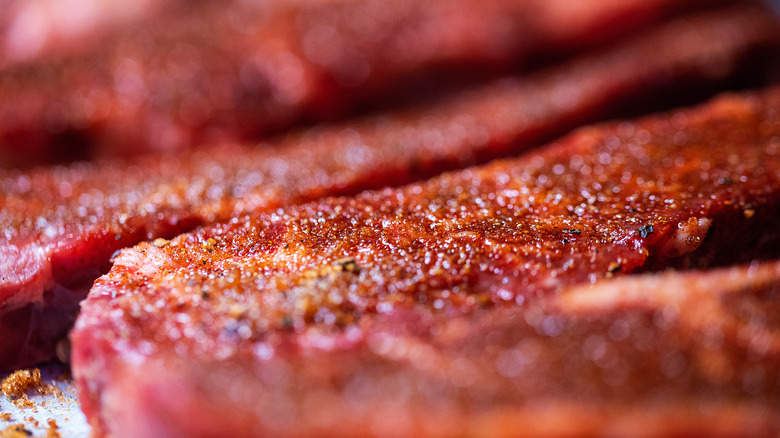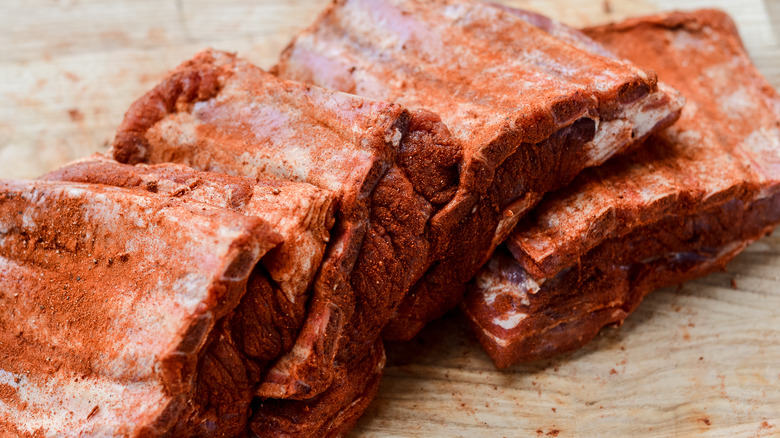The Reason Early Salting Can Ruin Your Prime Rib
When cooking red meat, most recipes will tell you to start by prepping the meat with a generous sprinkling of salt (and sometimes pepper) on all sides of the cut, including the edge. This step isn't just about tradition — there are good reasons for it. Salt not only enhances the meat's flavor but also tenderizes it. Additionally, if you're planning to give your prime rib a good sear, salt or a dry rub will dry out the exterior of the meat. This creates the Maillard reaction, the browning process that forms a beautiful crust while the rib is seared. This is a great foundation to develop upon for the rest of your cooking process.
However, there's a catch: While salt will improve your pricey slab of carefully selected prime rib, timing matters a lot. Sprinkling your prime rib with salt too early can backfire. (There's also such a thing as salting your meat too late, but that small window is much easier to avoid.)
A common mass example of salting too early is during the holiday season. Like clockwork, specials are offered on prime ribs about a week before Christmas. Shoppers rush to buy them on sale for a prime rib Christmas dinner the following week, but once they bring the cut home, some will salt and leave the prime ribs to "age" for a full week. This is way too early to salt! By the time you're ready to cook a week later, you might end up with a dry, chewy slab of meat instead of a juicy and succulent cut. You have to be strategic about the time you salt your ribs for the best flavor and texture.
Early salting is a risk you don't want to take
Salting is capable of working magic on your prime rib thanks to a physical phenomenon called osmosis. Essentially, water tends to move from a place containing less salt to another place that contains more. That's why when you sprinkle salt on top of your prime rib, the juices are instantly drawn from deep within the muscle strands of the meat and onto the surface. All of that meat juice will eventually dissolve the salt crystals, creating a brine that coats the meat. Later, that brine can be re-absorbed into the meat, greatly enhancing its flavor. Additionally, the muscle proteins within the meat are degraded by this process, which tenderizes the prime rib.
However, just like with anything, a bit too much and for too long can harm more than help. If you leave the salt on for too long, it'll draw out all of the moisture from the beef until it becomes very dry, and your prime rib will then taste like beef jerky or, in extreme cases, leather. So, while it's more convenient to salt your meat several days in advance then forget about it until it's time to bust it out and cook, you'll want to wait as closer to cooking time to avoid making seasoning mistakes.
The key is to time it just right
If you're looking to cook it quickly, 45 minutes is the minimum time needed for the salt to extract the meat's juices, break down the texture of the meat, and allow it to reabsorb the meaty brine. If you salt the meat closer to cooking time than that, the brine-y juice that the salt has drawn out won't have enough time to be reabsorbed by the meat. This can result in a dry rib that leaks salty drippings as you cook.
If you've frozen your prime rib and are defrosting it on the countertop, any point during the three hours it takes to reach room temperature is a good window for salting. However, if you do want to salt the rib a few days in advance for more flavor and tenderness, don't salt it any more than four days ahead. Any time before that is too early. If salted more than four days in advance, the prime rib will get a desiccated texture. (This is why Christmas prime rib that's salted a week ahead turns into a dry husk by the time it's brought out to cook.)
Be as generous as you can with the salt, and make sure to coat every bit of the prime rib with a thin layer to ensure that there's flavor in every bite instead of the taste being all over the place. When it's time to cook, you can just brush any of the excess salt off and get to work with a nice prime rib recipe!


